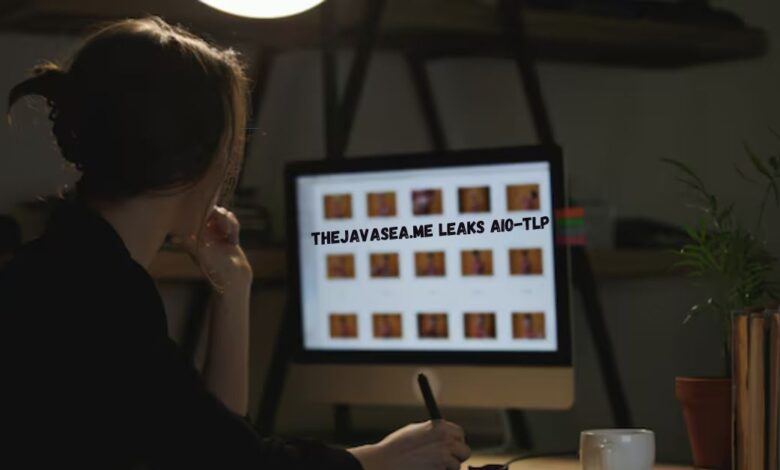Thejavasea.Me Leaks Aio-Tlp: A Guide to Understanding Content Leaks

The internet is an ever-expanding landscape of content, ranging from entertainment and news to specialized knowledge and community-driven resources. However, with the widespread sharing and accessibility of information, some platforms gain attention for sharing leaked or unauthorized content. Thejavasea.Me Leaks Aio-Tlp, has become a point of interest among internet users who seek content from various sectors. In this article, we will explore the context of these leaks, the implications for users and creators, and ways to approach this content safely and responsibly.
Understanding the Background of Thejavasea.me
Thejavasea.me is a digital platform known for its hosting of varied and sometimes sensitive content. While many users flock to it to access resources they might not find elsewhere, it is also a source of considerable debate. This platform has gained traction for its AIO-TLP leaks, a format that has become widely used among those interested in aggregated content collections.
AIO, which stands for “All-In-One,” is a label that refers to consolidated packages containing a variety of content, whether files, documents, or multimedia, bundled together for ease of access. TLP, or “Traffic Light Protocol,” is a designation often used in cybersecurity contexts to categorize information sensitivity, though on Thejavasea.me, it often appears as a tag to categorize the type or nature of content leaks. The combination of AIO and TLP tags thus indicates bundled leaks that span multiple categories, presented in an accessible and organized format.
What are AIO-TLP Leaks on Thejavasea.me?
Thejavasea.Me Leaks Aio-Tlp refer to collections of content—ranging from private documents to multimedia files—that have been released without the authorization of the original owners. Users are drawn to these leaks because of the allure of obtaining otherwise exclusive or hard-to-access information, all within one convenient file or folder. The appeal lies in the variety of content that these leaks provide, offering insights, entertainment, and even resources that might otherwise be locked behind paywalls or other restrictive measures.
Types of Content Found in AIO-TLP Leaks
The content in Thejavasea.Me Leaks Aio-Tlp can vary widely, and may include:
- Private Documents: This can include sensitive documents such as personal identification information, financial records, and even confidential business reports.
- Multimedia Files: Leaks often contain videos, images, and other multimedia content that were initially intended for limited or paid access.
- Educational Resources: Some AIO-TLP leaks include paid courses, e-books, and subscription-only educational material.
- Business Data: This might include proprietary business documents, operational strategies, and other internal data from corporations.
The Legal and Ethical Implications of Accessing Leaked Content
Accessing leaked content from platforms such as Thejavasea.me raises various legal and ethical questions. The content shared on these platforms is typically unauthorized, meaning that the original owners or creators have not consented to its distribution. Here, we explore the legal aspects and the ethical considerations that every user should be aware of before engaging with such content.
Legal Risks of Consuming Leaked Content
One of the significant risks of accessing Thejavasea.Me Leaks Aio-Tlp is the potential for legal repercussions. Unauthorized distribution of content often violates intellectual property rights, which protect the creators and owners of content from unauthorized sharing. Depending on the nature of the content, users could face penalties for downloading or using it, particularly if the content is protected by copyright law or includes confidential information.
For example, users who access personal data leaks or corporate documents may find themselves in violation of privacy and data protection laws. In many jurisdictions, even the act of downloading unauthorized content can lead to legal consequences, though enforcement varies.
Ethical Concerns Around Leaks and Privacy
Beyond legal risks, there is a strong ethical argument against accessing and sharing leaked content. Leaks often involve private information, which could harm individuals or organizations if widely circulated. Ethical considerations become especially pertinent when leaked content includes personal identification details, photos, or sensitive corporate information. Consuming such content implicitly supports the act of leaking and disrespects the privacy and efforts of the original creators.
Risks of Navigating and Accessing Thejavasea.me
Aside from legal and ethical concerns, there are practical risks to consider when visiting platforms like Thejavasea.me, as such websites often operate without strict security measures and can expose users to cyber threats.
Exposure to Malware and Security Threats
Users accessing content from Thejavasea.me are at a heightened risk of encountering malware, spyware, and other harmful software. Unauthorized content-sharing sites are rarely secure and often contain embedded malicious code in downloadable files. This can compromise the user’s device security, leading to data theft, system corruption, or even ransom situations where attackers demand money to release encrypted data. It is crucial to consider security tools such as antivirus software when navigating such sites, though avoiding these platforms altogether is the safest option.
Privacy Risks
Many sites like Thejavasea.me do not prioritize user privacy. By engaging with these platforms, users risk having their data collected or compromised. Sites that engage in unauthorized content sharing often have lax security policies, which may allow third parties to collect users’ browsing behavior or personal information. In some cases, users may unknowingly grant the site permissions that expose their device to potential data breaches or unwanted tracking.
Why People Are Drawn to Leaked Content on Thejavasea.me
Despite the risks, certain factors contribute to the popularity of Thejavasea.me and similar platforms. Understanding these motivations can provide insight into why such sites continue to thrive despite ongoing efforts to shut them down or dissuade users from accessing leaked content.
Access to Exclusive or Restricted Content
One of the primary reasons users flock to Thejavasea.me is to access content that they otherwise could not obtain without payment or permission. This allure of exclusivity draws individuals interested in obtaining premium content or resources that would typically require a subscription, fee, or personal access rights.
Financial Barriers
The cost of subscribing to multiple services, purchasing exclusive material, or even gaining access to educational resources can be prohibitive. As a result, many users turn to leaks on platforms like Thejavasea.me as a way to bypass these financial barriers and gain access to content that might otherwise be beyond their means.
Curiosity and Knowledge-Seeking
Human curiosity plays a significant role in the popularity of leaked content. The intrigue of discovering private or unreleased information appeals to a natural desire for exploration and knowledge. For some users, this curiosity drives them to explore Thejavasea.me not for malicious purposes, but to satisfy an urge for discovery.
Navigating Thejavasea.Me Leaks Aio-Tlp Responsibly and Safely
For those who choose to explore platforms like Thejavasea.me, there are precautions that can help mitigate risks, though absolute safety can never be guaranteed on such sites. Here are some general guidelines to keep in mind.
Avoid Downloading Unknown Files
One of the primary dangers on leak sites is downloading files without knowing their content. Files, especially in formats such as .exe or .zip, may contain hidden malware. It is advisable to avoid any downloads, particularly those that are not verified or come from untrusted sources.
Use Security Software
Having strong antivirus and anti-malware software installed on your device can help provide a layer of protection when accessing risky sites. Regular scans and real-time protection can identify and eliminate potential threats before they compromise your system.
Use Caution with Personal Information
Leak sites may attempt to collect user information or place tracking tools on visitors’ devices. To reduce this risk, avoid providing any personal information on such platforms, and consider using a virtual private network (VPN) to mask your IP address and maintain anonymity.
The Future of Thejavasea.me and AIO-TLP Content
As authorities and technology companies continue to fight against unauthorized content distribution, platforms like Thejavasea.me may face increased scrutiny. The advancement of cybersecurity measures, combined with stricter laws on content sharing, could eventually limit the reach of leak-based websites. However, as long as there is demand, the cycle of content leaks may persist in some form, with sites emerging and evolving to meet user needs.
Potential for Legal Crackdowns
Regulatory bodies worldwide are increasingly focusing on digital content theft and privacy violations. Legal crackdowns on platforms such as Thejavasea.me may become more frequent as lawmakers strive to protect intellectual property and individual privacy. It is likely that in the coming years, leak sites will face even greater legal pressure, making it more challenging for them to operate openly.
The Ethical Shift in Digital Content Consumption
The digital age has amplified discussions around ethical consumption, and there is a growing awareness among internet users about the implications of accessing unauthorized content. As more people become conscious of the consequences, a cultural shift may deter casual users from engaging with leaked content. With ongoing education and awareness efforts, ethical digital consumption could become the norm, reducing the demand for unauthorized content and minimizing the influence of platforms like Thejavasea.me.
Conclusion
Thejavasea.Me Leaks Aio-Tlp represent a part of the complex and often controversial world of online content sharing. While the allure of obtaining exclusive content can be strong, users should weigh the potential risks, legal implications, and ethical concerns involved. By understanding these factors, users can make informed decisions and approach their digital consumption with greater awareness and responsibility. As technology and legal frameworks evolve, the way we navigate and interact with online content will undoubtedly continue to change.



